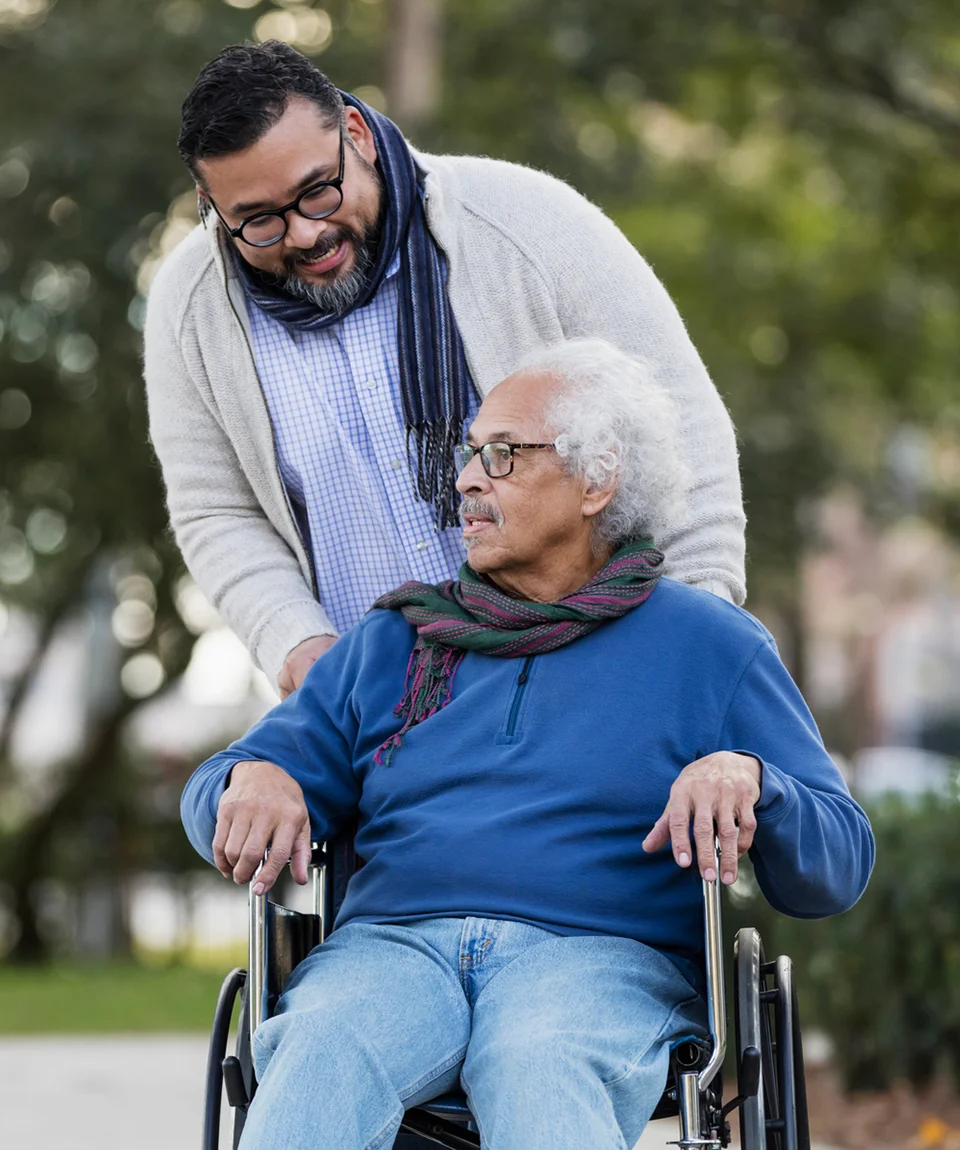What is atrial fibrillation?
Atrial fibrillation (Afib or AF) is a type of irregular heart rhythm (arrhythmia). Arrhythmias are due to electrical signal disturbances of the heart. Afib is the most common arrhythmia.
The risk of developing atrial fibrillation increases with age and with other risk factors such as diabetes, high blood pressure and underlying heart disease. The main complications of atrial fibrillation are stroke and heart failure.
Atrial fibrillation affects the top two chambers of the heart (the atria). Arrhythmias can also occur in the two chambers below the atria (the ventricles), which tend to be more serious than arrhythmias affecting the atria.
The atria are the heart's collecting chambers. Regular electrical signals help push blood efficiently from the atria into the pumping chambers (the ventricles). From the ventricles, blood is pumped to the rest of the body. In Afib, the electrical signals are fast, irregular and disorganized, and the heart may not pump as efficiently.
Atrial fibrillation can cause your heart to beat very quickly, sometimes more than 150 beats per minute. A faster than normal heartbeat is known as tachycardia.
Most people with Afib lead active, normal lives with treatment, but untreated it can interfere with your quality of life. Talk to your doctor if you have Afib and continue to feel unwell.
20%
Approximately 20% of ischemic strokes can be attributed to Afib.
Complications from Afib
Untreated atrial fibrillation puts you at a higher risk for stroke and heart failure.
People with atrial fibrillation have 3 to 5 times greater risk for ischemic stroke. During Afib, the atria contract chaotically. Because the atria aren’t moving blood properly, blood pools and gets stuck in the grooves of the heart. Blood clots may form, which could get pumped to the brain. An ischemic stroke is caused when blood flow to the brain is interrupted by a clot in a blood vessel in the brain. It is estimated that one-fourth of all strokes after age 40 are caused by Afib.
The risk of stroke depends on several other risk factors including the presence of heart failure, having high blood pressure or diabetes, being over 40 years of age, or having had a previous stroke or a mini-stroke (TIA).
Studies show that long-term use of the blood thinner warfarin in patients with Afib can reduce the risk of stroke by 70 to 80%.
Atrial fibrillation can also lead to heart failure. Heart failure is a condition in which your heart can't circulate enough blood to meet your body's needs. Afib’s irregular, fast heart beat leads to ineffective pumping of the blood which – especially if not controlled – may weaken the heart.
Types of Afib
Paroxysmal: temporary episodes that come and go. They start suddenly and then the heart returns to a normal beat on its own without medical assistance, usually within 24 hours.
Persistent: episodes that last longer than seven days. Usually treatment is needed to return the heart to a normal rhythm.
Permanent: the irregular heart rhythm lasts for more than a year despite medications and other treatments. Some people with permanent Afib do not feel any symptoms or require medications.
Causes
Common causes of Afib include:
- high blood pressure – the most common risk factor for Afib
- heart failure
- coronary artery disease which has led to a heart attack
- coronary artery bypass surgery
- cardiomyopathy
- diabetes
- myocarditis or pericarditis – infection or inflammation of the heart
- diseases that damage the valves of the heart
- hyperthyroidism – overactive thyroid
- pulmonary embolism – a blood clot in the lung
- atrial septal defect (repaired in childhood) and other congenital heart defects
- heavy alcohol use
- unhealthy weight
- sleep apnea
- age – Afib is more common in older people
In many cases, the cause of atrial fibrillation is not known.
If you develop Afib before the age of 60 without any structural heart disease, you may have idiopathic (or lone) atrial fibrillation. Researchers have identified a handful of genes that predispose families to idiopathic Afib. It is also possible for young people without Afib in their family to develop the disease.
Symptoms
Some people with Afib may feel fine and not know they have the condition until it is found in a routine test called an electrocardiogram. Other people have symptoms. The symptoms affect people in different ways. If you are experiencing any of these Afib symptoms, visit your doctor.
- palpitations – this might feel like your heart is racing, beating irregularly or flip-flopping in your chest.
- feeling very tired/ having no energy – you may feel short of breath or weak with the slightest physical effort.
- chest discomfort
- feeling light-headed or dizzy
- sweating
- feeling anxious
- trouble concentrating
If you are experiencing chest discomfort or other signs of a heart attack, call 9-1-1 or your local emergency number immediately.
Ask your doctor to check your pulse on a regular basis.
Women and atrial fibrillation
The risk of developing Afib increases with age. Afib is a significant risk factor for stroke. Because women live longer than men, there are more women living with Afib. Strokes caused by Afib are often more severe in women and more women than men die from Afib-related stroke or have more deficits and poorer quality of life.
Read more about women and stroke.
Diagnosis
If your pulse is fast and your heartbeat is irregular, your doctor may check you for Afib. They will take your medical history and question you about symptoms and risk factors.
Questions may include:
- How long have you had symptoms? Describe them. Do they come and go?
- Do you have other medical conditions?
- How much alcohol do you drink?
- Does anyone in your family have Afib?
- Do you have heart disease or a thyroid condition?
Tests include:


Treatment
Your treatment will be based on your risks, medical profile, needs, preferences and how much symptoms are interfering with your quality of life.
There are two general treatment strategies – rate control and rhythm control. Your doctor will determine which strategy is best for you based on your symptoms and other factors.
- Rate control: Almost every patient with atrial fibrillation will be prescribed a medication to slow their heart rate. For some people, this type of medication is enough to control their symptoms.
- Rhythm control: This is an attempt to prevent an irregular heartbeat by restoring and maintaining a normal, regular heartbeat. The first step is medication to prevent the Afib from occurring. Some patients may also require electrical cardioversion. This is a controlled electric shock to the heart to restore a normal rhythm. On rare occasions medications and electrical cardioversion do not work. You may be referred to a specialist and considered for an electrophysiology study and catheter ablation to stop the Afib from recurring.
Medications
The medications used for atrial fibrillation are:
- Blood thinners reduce the risk of stroke. An anti-platelet like ASA (Aspirin) or an anticoagulant like warfarin prevents clots from forming and travelling to the brain and causing a stroke.
- Beta blockers and calcium channel blockers help slow the heart rate and allow it fill properly with blood.
- Anti-arrhythmics and digoxin are drugs that prevent abnormal heartbeats and help restore normal rhythm.
Surgeries and other procedures
- Cardioversion therapy: Electrical pulses are sent through paddles to the heart to jolt the heart back into normal rhythm. Cardioversion is similar to defibrillation, but uses much lower levels of electricity.
- Electrophysiology studies (EPS) and catheter ablation: Some people with Afib – who do not respond to medications or electrical cardioversion – require an EPS to stop Afib from recurring. EPS testing is used to locate the site of the irregular electrical impulses in the heart. Catheter ablation is then performed to destroy – through tiny burns – the electrically chaotic heart tissue. Ablation creates scars in the heart that stabilize the electrical short circuits.
- Implantable pacemaker: A surgically implanted device that helps regulate heart rate and rhythm by using electrical pulses to prompt the heart to beat at a normal rhythm.
Lifestyle
You can lower your risk of developing other heart diseases and stroke by knowing and controlling your blood pressure, diabetes and blood cholesterol. It’s also important to lead a healthy lifestyle.
- Be smoke-free.
- Be more active.
- Aim for a healthy weight.
- Eat a healthy balanced diet – here are some specific diets you can follow that have been proven to reduce the risk of heart disease.
- Drink less alcohol.
- Manage stress.
Talk to your doctor about the lifestyle changes that will benefit you the most.
Living with atrial fibrillation
- Pay attention to your emotional reaction.
It’s normal to feel worried or afraid after a diagnosis of heart disease. Find someone you can turn to for emotional support like a family member, friend, doctor, mental health worker or support group. Talking about your challenges and feelings could be an important part of your journey to recovery. - Don’t be afraid to exercise.
Sometimes people feel they can’t exercise with atrial fibrillation because they don’t feel well or they are afraid. As long as you are feeling well, you can still exercise.
If you have atrial fibrillation, staying physically active will have a positive impact on your overall health. Talk to your doctor before you become more physically active. - Manage your blood pressure.
High blood pressure is a risk factor for stroke and other heart-related problems, in addition to being a risk factor for atrial fibrillation. - Visit your doctor regularly to have your atrial fibrillation monitored.
- Cardiac rehabilitation is a personalized program of exercise, education and counselling to help you recover from heart disease and reduce your risk of having other heart problems in the future. Talk to your doctor about how to find a program in your area or contact your public health department or hospital. The Canadian Association of Cardiac Rehabilitation also has a cardiac rehabilitation program directory to help you find a program in your community.
